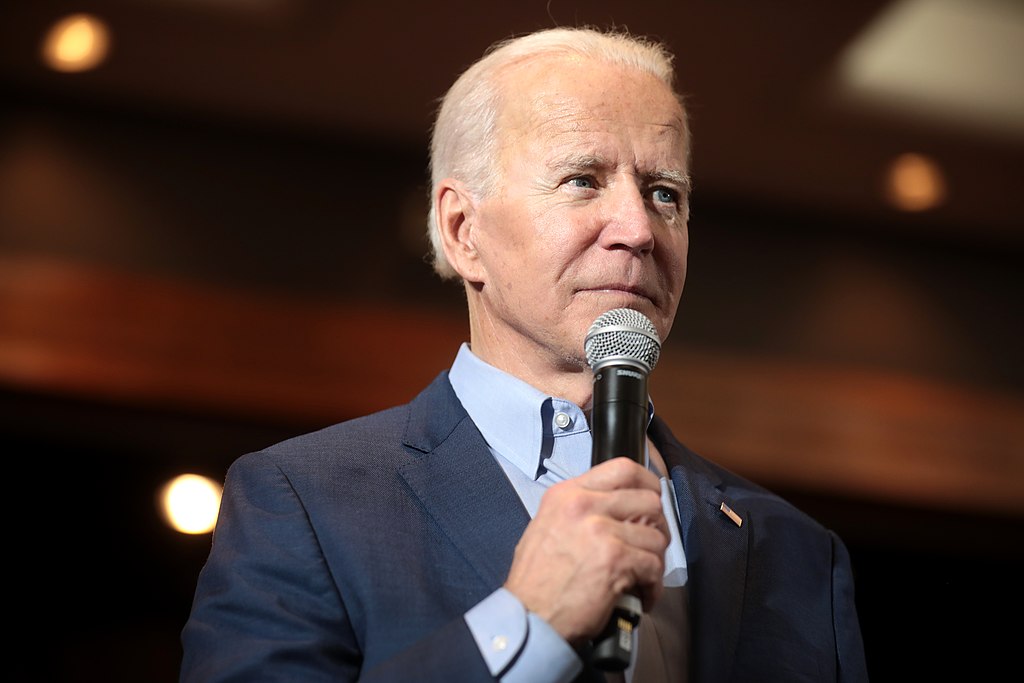“Law and order”. One of the most-shared tweets of the US president in recent months was a three-word slogan, repeated loudly and often, that has gradually become his sole platform for re-election. Accordingly, Donald Trump has taken to criticizing Joe Biden for being “soft on crime”. Vice President Mike Pence, meanwhile, has called the Democratic candidate a “Trojan horse” for Socialism who wants to defund the police.
To the contrary, Biden’s record shows that throughout his career he has authored and supported a wide range of security laws. While not always supported by his party’s left wing, Biden’s positions put the Democrats firmly to the center right on security matters.
History repeats
In 2016, Trump could talk of nothing but immigration, which he painted as a scourge impoverishing America. Four years later, his target has changed. This time, the danger is coming from within in the form of rioters, supposedly burning and pillaging the country’s major cities, while the Democrats are powerless to stop these savage hordes from setting the entire United States ablaze.
This isn’t a new strategy for the Republicans. In fact, it dates back to 1968, when the GOP won considerable power in Congress by capitalizing on racial tensions and rising crime. When Martin Luther King, Jr., was assassinated, riots large and small broke out. Some white Americans listened to the words of George Wallace, the hard-right governor of Alabama who was making an independent run for president. Wallace promising bring back order “by any means necessary”, and Richard Nixon was quick to copy Wallace’s security program, adding the concept of a “silent majority” in the country.
Trump’s 2020 campaign strategy is no different. The president is trying to unite uneasy white voters who feel the same fears that once gripped their parents or grandparents. Just as Nixon did, Trump exaggerates the scale of the violence, highlighting its most frightening aspects in an attempt to draw support from the so-called silent majority.
Biden is far from an ideal scapegoat the question of security, however. Since 1982, the Democratic candidate has focused on the issue, and hasn’t hesitated to reach out to Republicans. In 1984, he forged an alliance with the conservative Republican chairman of the Judiciary Committee, Strom Thurmond, to pass a far-reaching anti-crime bill, beefing up federal sentencing for drug trafficking, and recommending all suspects’ goods be confiscated prior to verdict. In 1986, Biden was the chief author of a law designed to fight drug addiction with tougher sentencing for trafficking and possession. African-Americans were the most impacted by this law.
Joe Biden’s solid security record
In 1988, Biden co-sponsored another anti-drug law, increasing prison sentences for drug trafficking and transportation, and creating the Office of National Drug Control, which continues to coordinate and manage federal efforts in the fight against drugs. In 1989, at the height of punitive anti-drug policy and mass incarcerations, Biden even went on television to criticize President George H.W. Bush’s proposal to increase these efforts, saying, “Quite frankly, the President’s plan is not tough enough, bold enough, or imaginative enough to meet the crisis at hand”.
In 1994, Biden’s law against violent crime – often referred to as the Biden Crime Bill – put more than 100,000 extra police officers onto American streets and considerably increased federal support for the fight against crime and the war on drugs. His Senate biography presents his legislative record in flattering terms: “Senator Biden is a key leader in the war against crime and drugs. He has played a decisive role in the development of almost every major crime bill over the last two decades.”
Out of all these laws, the 1994 crime bill has caused controversy among Democrats over the past few months. For many progressives, Biden’s crime law contributed to mass incarceration. While it is true that the bill proposed increased imprisonment as a tool in the fight against crime, statistics reveal a more nuanced picture. Put simply, both then and now, 92 out of 100 prisoners are incarcerated in state rather than federal, prisons. While the law encouraged states to be more severe, few follow the federal advice. In other words, the reasons for mass incarceration are to be found in local, rather than federal, policies.
Winning over the right
Lastly, it is interesting to note the context in which Biden developed this legislation. In 1994, violent crime had been consistently rising since the 1960s and had become an urgent priority. As Michael Waldman, a professor at NYU School of Law, pointed out in a piece for The Atlantic :
“It’s not only the Democratic Party that’s changed, it’s the country and the context that’s changed. Crime between 1960 and 1990 tripled… The level of social disruption and panic that caused is hard to explain now, because since then the crime rate has been dropping.”
Politically, the 1994 law was an opportunity for the Democrats and President Bill Clinton, recently elected, to take back issues of policing and justice from the Republicans. Up until then, it had been their exclusive terrain. The 1988 presidential election, in which George H.W. Bush triumphed against Michael Dukakis, was largely played out on these grounds, with Bush accusing Dukakis of being “soft on crime”. In 1992, the Democrats were extremely worried that history would repeat itself. Biden’s proposal allowed them to claim that the Democrats would impose harsher federal prison sentences and encourage states to do the same. The law included funding for more prisons and the hiring of 100,000 extra police officers.
Biden’s attitude was therefore in line with the general sentiment within the Democratic party, which wanted to tackle the growing problem of crime. Since then, however, Biden’s views on the issue have evolved. For example, he stated that the mandating of extra sentences for crack was “a big mistake”. He has often stated that while he hasn’t “always gotten things right,” he has “always tried”. These days, Biden focuses on more popular measures, such as the Violence against Women Act and supporting treatment for drug addiction. Despite its shortcomings, however, the 1994 bill still reflects Biden’s proactive stance on crime.
Once officially invested by his party, Biden dedicated his first speech, in Pittsburgh, to the question of security, as a counterpoint to Trump’s claims at the Republican convention that Biden’s America would be “lawless”. In his speech, the Democratic candidate accused Trump of “stoking violence” and asked Americans a simple question: “Do you feel safe in Trump’s America?.
During his campaign Biden has reiterated his support for increased police resources, in particular for the development of initiatives to strengthen community relations and equip officers with body cameras. Trump’s claims, repeated in his campaign ads, that Biden wants to "defund the police” are therefore false. Some activists from the Black Lives Matter movement have called for this, but it not Biden – quite the opposite.
This is obvious when you consider how Joe Biden is perceived by those in the left wing of the Democratic Party – that he persists in prioritizing security concerns over the demands of communities, and regardless of the wave of mistrust of the police among supporters of Bernie Sanders. Biden has made a clear choice: to stand firm in his own ideas and trust that the very threat of Trump’s returning to the White House will be enough to win the support of the turbulent left wing of the Democratic party.
Jean‑Eric Branaa’s biography “Joe Biden” was published by Nouveau Monde on 7 October.
The Fact check US section is supported by Craig Newmark Philanthropies, an American foundation fighting against disinformation.
Translated from the French by Alice Heathwood for Fast ForWord



 Ohio Man Indicted for Alleged Threat Against Vice President JD Vance, Faces Additional Federal Charges
Ohio Man Indicted for Alleged Threat Against Vice President JD Vance, Faces Additional Federal Charges  Trump Lifts 25% Tariff on Indian Goods in Strategic U.S.–India Trade and Energy Deal
Trump Lifts 25% Tariff on Indian Goods in Strategic U.S.–India Trade and Energy Deal  Pentagon Ends Military Education Programs With Harvard University
Pentagon Ends Military Education Programs With Harvard University  U.S. Announces Additional $6 Million in Humanitarian Aid to Cuba Amid Oil Sanctions and Fuel Shortages
U.S. Announces Additional $6 Million in Humanitarian Aid to Cuba Amid Oil Sanctions and Fuel Shortages  Netanyahu to Meet Trump in Washington as Iran Nuclear Talks Intensify
Netanyahu to Meet Trump in Washington as Iran Nuclear Talks Intensify  U.S. to Begin Paying UN Dues as Financial Crisis Spurs Push for Reforms
U.S. to Begin Paying UN Dues as Financial Crisis Spurs Push for Reforms  Trump Backs Nexstar–Tegna Merger Amid Shifting U.S. Media Landscape
Trump Backs Nexstar–Tegna Merger Amid Shifting U.S. Media Landscape  U.S.-India Trade Framework Signals Major Shift in Tariffs, Energy, and Supply Chains
U.S.-India Trade Framework Signals Major Shift in Tariffs, Energy, and Supply Chains  China Warns US Arms Sales to Taiwan Could Disrupt Trump’s Planned Visit
China Warns US Arms Sales to Taiwan Could Disrupt Trump’s Planned Visit  Trump Allows Commercial Fishing in Protected New England Waters
Trump Allows Commercial Fishing in Protected New England Waters  Federal Judge Restores Funding for Gateway Rail Tunnel Project
Federal Judge Restores Funding for Gateway Rail Tunnel Project  Trump Signs Executive Order Threatening 25% Tariffs on Countries Trading With Iran
Trump Signs Executive Order Threatening 25% Tariffs on Countries Trading With Iran  Jack Lang Resigns as Head of Arab World Institute Amid Epstein Controversy
Jack Lang Resigns as Head of Arab World Institute Amid Epstein Controversy  Trump’s Inflation Claims Clash With Voters’ Cost-of-Living Reality
Trump’s Inflation Claims Clash With Voters’ Cost-of-Living Reality  Trump Signs “America First Arms Transfer Strategy” to Prioritize U.S. Weapons Sales
Trump Signs “America First Arms Transfer Strategy” to Prioritize U.S. Weapons Sales  Missouri Judge Dismisses Lawsuit Challenging Starbucks’ Diversity and Inclusion Policies
Missouri Judge Dismisses Lawsuit Challenging Starbucks’ Diversity and Inclusion Policies  New York Legalizes Medical Aid in Dying for Terminally Ill Patients
New York Legalizes Medical Aid in Dying for Terminally Ill Patients 
































